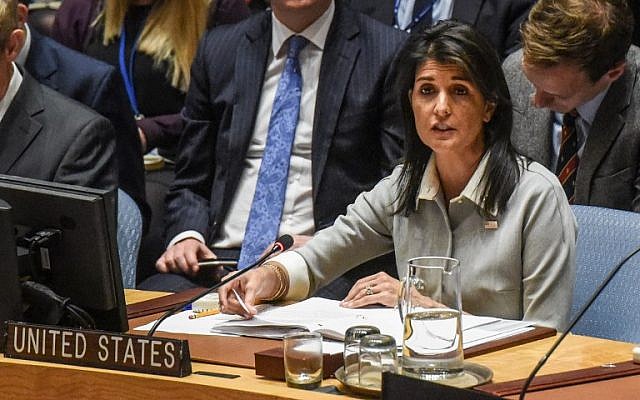Defiant Haley chides fuming Security Council members: ‘Change is hard’

At an emergency meeting of the UN Security Council on Friday, the US Ambassador to the United Nations Nikki Haley said President Donald Trump knew his decision to recognize Jerusalem as Israel’s capital would raise “questions and concerns,” but that he took it to advance peace between Israel and the Palestinians.
“I understand the concerns that members have in calling this session,” Haley said. “Change is hard.”
Washington’s move left it isolated as one after another fellow UN Security Council members — Russia, France, the UK, China, Egypt, Jordan and a host of others — condemned the announcement.
The debate unfolded at a largely symbolic emergency meeting of the council — no vote on a resolution was planned, as the US has veto power — two days after Trump reversed two decades of US policy on the holy city.
The meeting was convened by eight of the 14 non-US members of the council. It seemed a vivid show of the discord triggered by Trump’s announcement, which included plans to move the US embassy in Israel from Tel Aviv to Jerusalem.
Asked what he expected to come from the UN meeting, one diplomat said: “Nothing.” Another said the session would show US “isolation” on the issue.
Haley said Washington was more committed to peace “than we’ve ever been before — and we believe we might be closer to that goal than ever before.”
Haley said anyone who used Washington’s actions as a pretext for violence was “only showing” they were not partners for peace.
She noted that past Israeli-Palestinian agreements have been signed on the White House lawn, and that if there is a new agreement, there is “a good likelihood” it will be signed there as well, “because the United States has credibility of both sides.”
At the meeting, the UN coordinator for the Middle East peace process warned Security Council members of a risk of “violent escalation.”
Nickolay Mladenov warned that if the Israeli-Palestinian conflict isn’t resolved, “it risks being engulfed in the vortex of religious radicalism throughout the Middle East.”
Read More: Times of Israel
